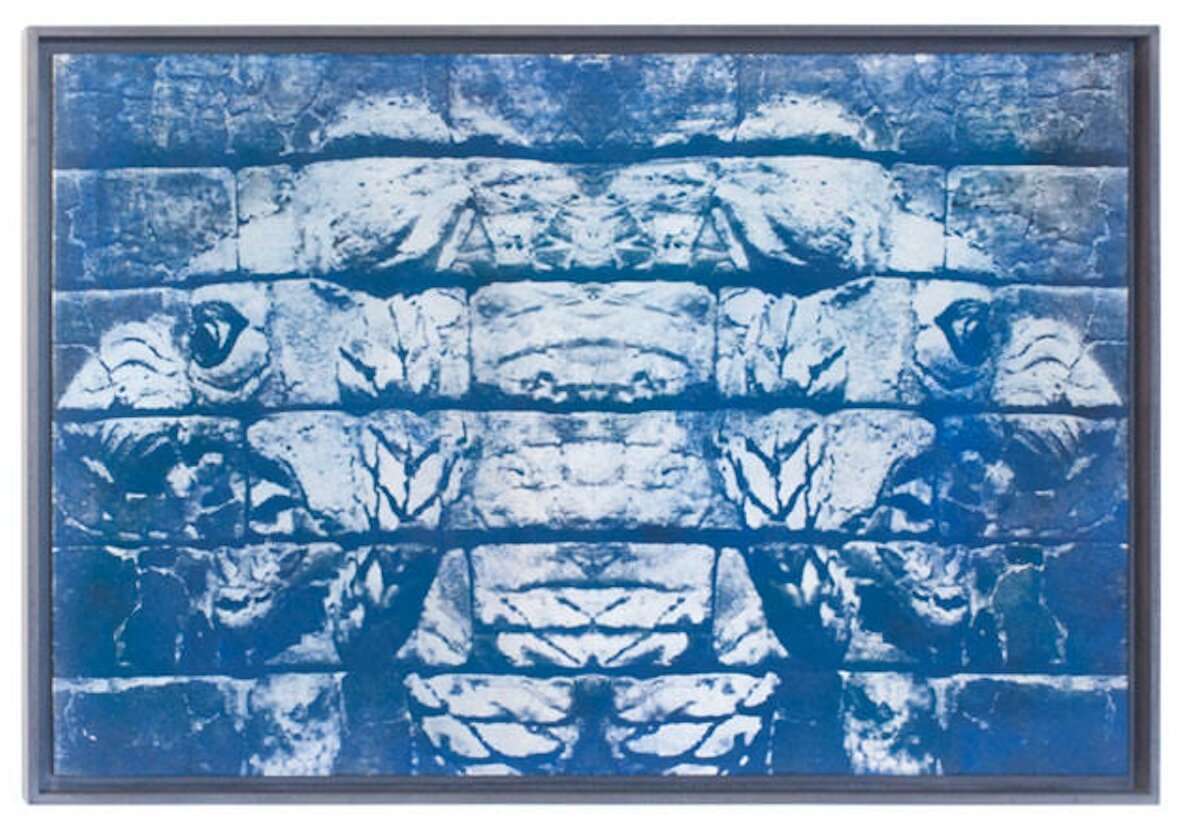Amir Fattal
Untitled
2015, Industrial dust, raw pigment and lacquer on aluminum , 106 × 71 cm
About the Artwork
In an untitled series of large silkscreens made with dust, pigment and lacquer printed on sheet aluminium, Fattal has focuses on images of recent acts of cultural desecration and destruction as they have been depicted throughout the Arab media, often using film supplied by the perpetrators themselves. As a counterpoint to this destructive orgy, not without irony, the series also includes a magnificent example of western conservation: the double headed lion from the Ishtar Gate in Berlin. For Fattal, this example of nineteenth-century cultural booty safely preserved from those who would now destroy it, presents a lively paradox: this regal, heroic heraldic image could also suggest a less admirable two-facedness that the West has often shown in its transactions in this region and continues to manifest in its cultural relations.
Throughout the diverse aspects of his multi-media practice, Amir Fattal’s work highlights present events and attitudes in reference to historical images or narratives. Both as silent witnesses and repositories of memory, Fattal appropriates and adapts chosen examples of previous art, architecture, photography or music as disruptive ‘objects’ in order to create an aesthetic unease out of which patterns of behavior or archetypical responses may be extrapolated. Fattal’s images and objects may, on first sight, seem innocent yet, when reproduced within the framework of his abiding concern with the fragility of life and culture, their associations become redolent of either barbarism or mortality; sometimes of both at the same time. In this respect he has become a protagonist of the cultivation and exposition of what could be described as memory subsumed within the continuing life of objects: fragments of the past living on and transformed by the present. His Jewish-Iraqi descent (both his parents were born in Baghdad, and he is first generation Israeli), as well as his current life as an artist in Berlin, have heightened a sense of tension that runs throughout his work, balancing delicately between the necessities for atonement and reconciliation.
The work shown in Points of Resistance is part of a body of work in which Fattal focuses on the systematic cycles of destruction of historical and religious monuments that have characterised warfare in the Middle East, Afghanistan and North Africa over the past twenty years. The propensity for iconophobia and iconoclasm (as well as for their opposite, iconolatry) has been present in the three monotheistic religions (Christianity, Islam and Judaism) since their inception and has recurred periodically throughout their histories as part of a broader ideological struggle for power. Recent manifestations of this struggle, however, particularly those perpetrated by Islamic groups, have demonstrated a strong, almost theatrical, media awareness in which destruction represents not so much a tool of ideology but, under the pretext of obliterating blasphemy, embodies the desire to eclipse both history and memory by shaming and denying them at the same time, rather in the same way that marauding soldiers violently rape the people they vanquish. In these works, the rape of memory is Fattal’s main subject. His meditations on loss and memory expose how victory is currently expressed by destruction and how these historical monuments have become ideological battlegrounds.
Bio
Amir Fattal was distinguished with the GASAG Art Prize in 2008 and graduated from Universität der Künste, Berlin, in 2009. Based in Berlin to this day, Fattal participated in numerous international group exhibitions. Acclaimed solo exhibitions include: Mesopotopography, Anna Jill Lüpertz Gallery, Berlin (2015); From the End to the Beginning, Kunstquerier Bethanien, Berlin (2014); Parallel Lines, Teapot Gallery, Cologne, Germany (2013); Goral Ehad, St-art, Tel Aviv, Israel (2012); Shadow of Smoke Rings on the Wall, Artitude Kunstverein, Berlin (2011); Tomorrow Gets Me Higher, Wilde Gallery, Berlin (2010). Selected group exhibitions include: Collection Enea Righi, Museo Fortuny, Venice (2016); Interior / Exterior / Sculpture, Belenius/Nordenhake Gallery, Stockholm, Sweden (2015); A Naked Singularity, Studio Garaicoa, Madrid, Spain (2015); Fragments of Empires, MOMENTUM, Berlin (2014-15); A Letter From Dr. Faustus, Herzliya Museum of Contemporary Art, Israel (2014); Fundación Botín, Villa Iris, Santander, Spain (2014); Dahlstrøm & Fattal, Beers Lambert Contemporary, London (2013); III Moscow International Biennale for Young Art, Moscow, Russia (2012); Body Without Body, Georg Kolbe Museum, Berlin (2011). Fattal is also curator and initiator of Tape Modern Berlin, an acclaimed series of group exhibitions featuring emerging and established artists.
Fattal is a conceptual artist whose practice is one of historical reflection grounded in the history of aesthetics and cultural schisms. Working in the media of video, photography, sculpture, and installation, his work forms a focused response to the diverse questions raised by his adoptive city of Berlin, where the memory, culture, architecture, indeed every thread in the fabric of this city is problematized by its history.


